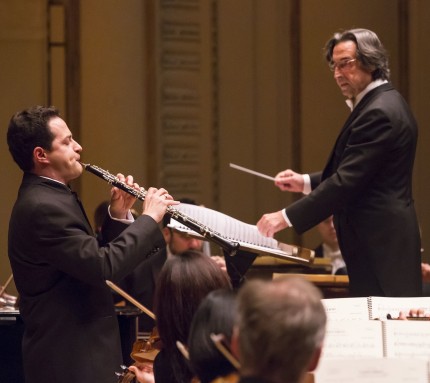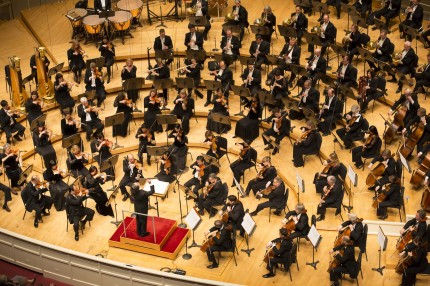Muti returns to CSO with rare Martinů and sensual Scriabin

Eugene Izotov performs the Martinů Oboe Concerto Thursday night with Riccardo Muti conducting the Chicago Symphony Orchestra. Photo: Todd Rosenberg
While Riccardo Muti elicits first-class results in Verdi and Austro-German cornerstone works, it is often in less frequently encountered repertory where the Chicago Symphony Orchestra’s music director produces his most winning performances.
Such was the case Thursday night, when Muti returned to conduct the final three weeks of the CSO season, leading off with a program of Haydn, Martinů and Scriabin.
Haydn remains the most underperformed of the great composers, in part because his wit and optimism seem out of sync with 21st-century angst. There’s also the practical fact that many conductors prefer to make a more imposing statement—or flashier impact—with late Romantic music for larger orchestras.
One aspect of Riccardo Muti that audience members only infrequently glimpse—usually in his impromptu stage remarks—is the Italian maestro’s terrific sense of humor, and that quality was manifest in Thursday’s delightful performance of Haydn’s Symphony No. 48.
Haydn’s symphony gained its title, “Maria Theresa,” by the work’s supposedly being performed for the Austrian royal. Though it dates from Haydn’s sturm und drang period, the festive C-major symphony is a cheerful work suitable for a festive occasion with its trumpet and high horn fanfares.
Muti has conducted Haydn selectively since talking the CSO helm, and, as Thursday’s stylish performance showed, his incisive touch in this repertoire shows this music to best advantage, with playing rich in wit and character while keeping within Rococo parameters.
Muti brought out Haydn’s humor with meticulous dynamic marking that never sounded pedantic. The more somber expression of the Adagio went with an airy grace, marred slightly by the wobbles of the outgoing principal horn. A stately minuet and rollicking finale rounded off a performance of terrific elan and high-spirited ebullience.
Few 20th-century composers remain as bafflingly neglected as Bohuslav Martinů. Despite an arduous life and an extended exile from his homeland, the Czech composer was remarkably prolific, writing in all genres, including six symphonies, fifteen operas, fourteen ballets, and a plethora of chamber music, all of a consistently high quality.
Kudos to Muti and CSO principal Eugene Izotov for bringing Chicago the belated premiere of Martinů’s Oboe Concerto. Like many of his works, the concerto was written during his American years, scored for chamber orchestra forces with piano, and crafted in a lean accessible manner with a wholly distinctive palette.
Izotov’s sterling musicianship has been a hallmark of the CSO since being appointed principal by Daniel Barenboim in 2005. Yet even by Izotov’s elevated standard, his performance was extraordinary—elegant, technically faultless and a model of taste and expressive refinement.
Martinů’s concerto has some showy moments but the prevailing style is one of amiable pastoralism and Izotov’s fluent, gracious playing was fully in synch. Launched with a beautifully rounded horn solo by Daniel Gingrich, the Poco andante explores a darker more unsettled expression and here Izotov was at his finest, playing with an affecting quiet eloquence, particularly in his extended cadenza with piano.
Izotov’s tone could have projected more boldly in the finale where it was fitfully subsumed by the orchestra’s hurly-burly, but the soloist’s relaxed jaunty style captured the essence of the music to perfection. Mary Sauer brought poise to the prominent piano part, and, under Muti’s baton, Izotov’s colleagues provided equally piquant and characterful support. Perhaps Muti might explore Martinů’s symphonies in future seasons.
Nearly a quarter-century ago, Muti recorded a series of Alexander Scriabin’s symphonic works with the Philadelphia Orchestra, a set that remains among the finest Scriabin documents.
Clearly, the Russian composer remains a Muti specialty as shown by the refined yet spectacular performance of Scriabin’s Symphony No. 3. Subtitled “The Divine Poem,” the work is scored for huge orchestra, and cast in three connected movements that run nearly 50 minutes.
Scriabin’s hedonistic brew of perfumed exoticism and overheated pantheism can seem as quaint and dated as a lava lamp. Yet it is clearly music that resonates with the CSO’s music director who led an involving and dexterously balanced performance.
Muti and his forces unspooled the vast structure in a single continuous arc, the surging sensuality palpable in the ebb and flow of the undulating sonic waves. Yet the conductor kept a firm rein on Scriabin’s music, consistently emphasizing the internal logic beneath the surface ecstasies and harmonic ambiguity, the three-trumpet leitmotiv sounding with greater impact at each iteration.
The CSO provided their music director with playing of great warmth and precision, with concertmaster Robert Chen’s silken violin solos evoking Scriabin’s languor in especially beguiling fashion.
The program will be repeated 1:30 p.m. Friday, 8 p.m. Saturday and 7:30 p.m. Tuesday. cso.org; 312-294-3000.
Posted in Performances






Posted Jun 07, 2013 at 12:41 pm by Sam
Did anyone catch Muti’s comments at the end? I was sitting in the terrace and couldn’t quite hear what he said.
Posted Jun 07, 2013 at 1:15 pm by Lawrence A. Johnson
A CSO spokeswoman said Muti mentioned that the poet Dante Alighieri added “Divine” to ‘The Comedy” after the fact and the word was not in his original title.
Posted Jun 08, 2013 at 10:14 am by Bob
A paraphrase closer to what Muti said: The Divine Comedy was originally simply titled Comedìa by Dante and only later was Divina added by Boccaccio. Less “humble” than Dante, Scriabin himself named his huge work “Divine” right from the beginning. [audience laughter]
Posted Jun 09, 2013 at 3:29 pm by Odradek
“Perhaps Muti might explore Martinů’s symphonies in future seasons”
We can only hope so; they’re some of the best of the 20th century. But I suspect this kind of initiative will come from younger conductors, like Alan Gilbert who conducted the 4th with the CSO a few years back.